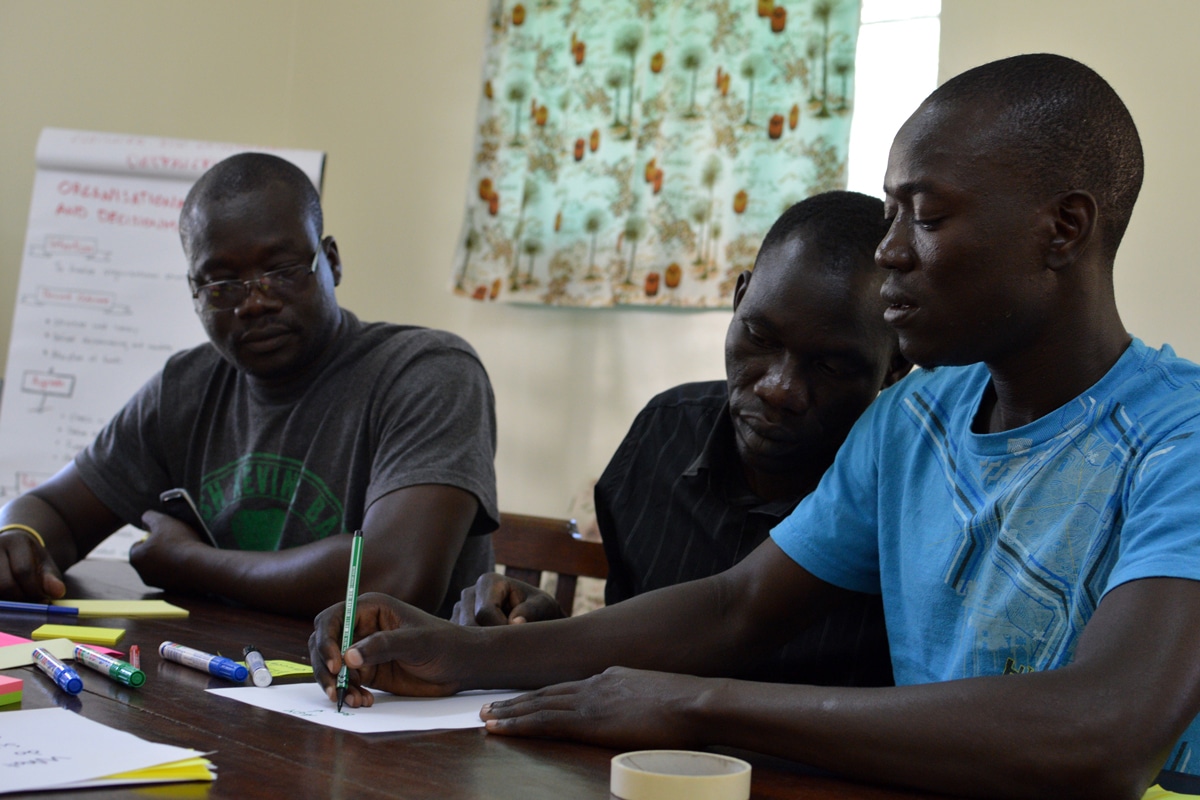Update on the Global LGBTQ Rights Movement

On the first leg of a multi-city journey across the United States and Canada, Goldin Institute senior advisor Frank Mugisha came to Chicago for a public event hosted by the Chicago Council on Global Affairs on April 27, 2017. “The Global LGBTQ Rights Movement” featured Mugisha in an hour-long conversation with Project& director Jane M. Saks before an audience upwards of 60 people in Chicago and hundreds online.
 Advisory board member Akif Irfan made opening remarks and introduced the panel. Given the primary topic of the evening, Irfan noted the one year anniversary of the murder of our friend and collaborator Xulhaz Mannan death at the hands of anti-gay extremists in Bangladesh.
Advisory board member Akif Irfan made opening remarks and introduced the panel. Given the primary topic of the evening, Irfan noted the one year anniversary of the murder of our friend and collaborator Xulhaz Mannan death at the hands of anti-gay extremists in Bangladesh.
[quote]While stunning victories are being won for gay rights in the US and around the world, we today remember the one year anniversary of the death of our friend and colleague in Bangladesh, Xulhaz Mannan, who was brutally murdered by a hate group for his public role as an LGBT advocate. Akif Irfan, Board of Advisors[/quote]
Over the course of an hour, Mugisha and Saks covered a spectrum of compelling, often gasp-inducing stories and reflections on Mugisha’s journey as an openly gay activist in Uganda. As recently as last August, he and a handful of colleagues at “SMUG” (the Sexual Minorities of Uganda), the organization which he leads, were arrested and jailed by local police at a Pride Uganda event. While he escaped physical abuse, he was grossly mistreated and his colleagues were physically assaulted, repeatedly. Recognized as one of Fortune Magazine’s “50 World’s Greatest Leaders,” Mugisha is a past Nobel Peace Prize nominee and a recipient of the Robert F Kennedy Human Rights Award.
[quote]Through the advocacy we do, we can create political capital around ourselves. It's given some bit of safety. We also think that if we have our own physical space it will give us security as well. Frank Mugisha, SMUG Uganda[/quote]
Frank Mugisha shared the latest news from his groundbreaking lawsuit against American pastor Scott Lively for “crimes against humanity” for his vitriolic hate speech against LGBTQ Ugandans, and advocacy against their safe, equal citizenship.
Thanks to the Chicago Council on Global Affairs, the conversation was filmed and archived and is now available to watch:
Frank Mugisha made many insightful comments during the conversation:
[quote]When you are on the battlefield, when you have backup, you can continue moving forward. The friends I have around the world keep me going. In the most troubling time in Uganda, when there was the anti-gay law, we were able to win thanks to our partners.[/quote]
[quote]The young people in Uganda call me or reach out on Facebook, saying 'we feel you speaking out for us here'.[/quote]
[quote]At SMUG, we've had to set up a program where we are managing crises as well as programming.[/quote]
[quote]When my colleagues and I came out of jail, I realized we had to work hard because the ignorance about LGBT people is so great.[/quote]
[quote]Homophobia was imported to Africa through religion. Religion has been embraced so much.[/quote]
[quote]The churches in Uganda have impunity. They can do anything they want and walk away.[/quote]
A special thank you to the Chicago Council on Global Affairs for hosting and live streaming the event. Amidst a wonderful team there, we wish to acknowledge Jon Macha, Tria Raimundo and Dzena Berbic for their thoughtful, gracious and professional partnership.
YOLRED: Now Open for Business

On behalf of my team here at YOLRED, I am proud to announce that we have opened our first official office in Gulu, Northern Uganda.

This is the latest exciting step in our journey and the achievement of a dream after the successful launch of the Youth Leaders for Restoration and Development (YOLRED) last fall. Our organization is the first organization in northern Uganda that is designed and run by former combatants and dedicated to serving and reintegrating our peers.
Before having our own space, we were previously limited to working at an array of restaurants around the Gulu community until the appropriate location could be found and secured. We now have a four room office located on a parcel of land 50x26 meters large. Although YOLRED is renting the property for now, rent is secured over the next seven months, through September of this year. Including a reception area, the YOLRED office accommodates our accounting, human resources and administration teams, as well as one large office space allotted for program team and community meetings.
Having our own office space is really a big accomplishment to both YOLRED and the community we serve. Now we have the security of having a space where we can plan, monitor, organize and meet. Other former combatants who are looking for support will now have a central and known place to come for help. My colleague Charles Okello put it best when he said:
"Now we are not seen as just a 'briefcase' organization that travels around to meet people where they are but also as an organization that is a safe space to visit. Its now easier for us to be visible to the national and international organizations that need to hear the perspective of former combatants".
Furthermore, having our own space will make it easier for us to operate efficiently and at a lower overall cost. Above all, having our own office is creating a great deal of good will with the community around us who can see a tangible display that we have a level of leadership, professionalism and support that many thought was impossible for former combatants.
Thank you to everyone who has helped us so far and we hope to welcome you in our new reception room if you travel to Gulu.
Youth Leaders from East Africa Tackle Violent Extremist Recruitment

East African communities have been struggling to respond to the rise in the recruitment of children into armed conflict by a range of violent extremist groups. In Kenya, the September 2013 attack on the Westgate mall by Al-Shabaab left over 67 dead and 175 injured echoed the terror of the bombing of the U.S. Embassy on Nairobi by Al-Qaeda-aligned terrorists in 1998. Between 2012-2014, Kenyan National Police tallied 312 people killed and 779 wounded in terrorist attacks according to Human Rights Watch. Extremist violence has increasingly become a security priority for the Kenya goverment and a deepening concern in Kenya’s civil society, especially as extremist groups are actively recruiting vulnerable youth for missions inside East Africa, in conflicts like Syria and even further abroad.
To address the issue of countering violent extremism and minimizing the risk of youth being radicalized, the “Regional Youth Forum on Countering Violent Extremism: Deepening Cooperation in Combatting Violent Extremism” (CVE) occurred from August 29-31, in Nairobi, Kenya. The training was part of a five-year “Regional Peace Programme” to foster unity and collaboration with regional youth and a wide variety of youth-focused organizations. Along with Arigatou International, the Goldin Institute hosted the gathering with Norwegian Church Aid, the Global Network of Religions for Children (GNRC), the National Counter Terrorism Centre, Somali Family Services, icco Cooperation, and BRAVE in mobilizing young people to engage in a shared dialogue toward finding concrete steps to achieve lasting solutions.
[slide]
[img path="images/000CRAVE2016.jpg"][/img]
[img path="images/001CRAVE2016.jpg"][/img]
[img path="images/002CRAVE2016.jpg"][/img]
[img path="images/003CRAVE2016.jpg"][/img]
[img path="images/004CRAVE2016.jpg"][/img]
[img path="images/005CRAVE2016.jpg"][/img]
[img path="images/006CRAVE2016.jpg"][/img]
[img path="images/007CRAVE2016.jpg"][/img]
[img path="images/008CRAVE2016.jpg"][/img]
[img path="images/009CRAVE2016.jpg"][/img]
[img path="images/010CRAVE2016.jpg"][/img]
[img path="images/011CRAVE2016.jpg"][/img]
[img path="images/012CRAVE2016.jpg"][/img]
[img path="images/013CRAVE2016.jpg"][/img]
[img path="images/014CRAVE2016.jpg"][/img]
[img path="images/015CRAVE2016.jpg"][/img]
[img path="images/016CRAVE2016.jpg"][/img]
[img path="images/017CRAVE2016.jpg"][/img]
[img path="images/018CRAVE2016.jpg"][/img]
[img path="images/019CRAVE2016.jpg"][/img]
[img path="images/020CRAVE2016.jpg"][/img]
[img path="images/021CRAVE2016.jpg"][/img]
[img path="images/022CRAVE2016.jpg"][/img]
[img path="images/023CRAVE2016.jpg"][/img]
[img path="images/024CRAVE2016.jpg"][/img]
[img path="images/025CRAVE2016.jpg"][/img]
[img path="images/026CRAVE2016.jpg"][/img]
[/slide]
It is widely understood, and recognized, that generally young people comprise the population most vulnerable to extremist recruitment due to factors such as unemployment, housing instability and insecurity, hunger, low educational opportunities, social disconnection, as well as individualized, internal factors including trauma. Consequently, the primary drivers of the forum were fifty young people from Kenya, Uganda, Somalia, South Sudan, Tanzania, Ethiopia supported by members of regional and international NGOs (non-governmental organizations) who attended.
 “One of the take-aways from the youth participants was that women and children are quite involved in the radicalization,” notes Dr. Dorcas Kiplagat, Network and Programs Manager for GNRC and former Goldin Institute Global Associate. “The understanding of violent extremism needs to be deepened with more people actually knowing about the process of radicalization. The Kenyan government is doing much, but people are complaining that the government isn't doing enough. There needs to be organization and education on what’s happening. The partnerships between government and civil stakeholders needs to be deepened, as well.”
“One of the take-aways from the youth participants was that women and children are quite involved in the radicalization,” notes Dr. Dorcas Kiplagat, Network and Programs Manager for GNRC and former Goldin Institute Global Associate. “The understanding of violent extremism needs to be deepened with more people actually knowing about the process of radicalization. The Kenyan government is doing much, but people are complaining that the government isn't doing enough. There needs to be organization and education on what’s happening. The partnerships between government and civil stakeholders needs to be deepened, as well.”
A worry for Dr. Kiplagat is that too often conversations about countering violent extremism don’t occur strategically, nor with regularity. For the most part, they’re high-level conversations which rarely engage the grassroots community which isn’t given the opportunity share thee on-the-ground perspective. This meeting in September was an important step in embedding these conversations within a credible, regional strategy.
“There needs to be greater opportunity for dialogue,” she notes. ‘We identify those involved in the extremist campaigns, but many times we don't empower them with knowledge and skills to resist. There is no one answer. It is the marginalized regions that are behind in terms of economic development. Young people in those situations feel excluded, and vulnerable. We can say religion is a main drive, but it's not. Christians have been attacked here in Kenya, but then we see Muslims coming to the defense of Christians, so it can't be blamed on that.”
By the forum’s end, youth participants and host organizations developed solid commitments and concrete plans of action for work in their home communities throughout East Africa. These included, among others: consistent engagement with youth; keeping a gender-lens on the radicalization of young people; identifying and working with the appropriate government section(s) addressing violent extremism; increasing employment opportunities and sustainability for individuals at-risk of recruitment; and, interfaith dialogue and mobilization being activated on the programmatic level.
ICCO Interchurch Organization for Development Cooperation) representative Angeline Nguedjeu made the closing remarks on the final day of the forum, recognizing that its realization was for indeed a “vision,” but that short and long-term goals to achieve were important to establish as soon as possible.
This Week in GI History: Manresa, Spain

This week we mark the anniversary of one of the Institute's defining events: the 2003 Building Social Cohesion in the Midst of Diversity and Migration conference held in Manresa, Spain.
At that Event, community leaders from over 20 cities gathered to explore best practices from their practical experiences building social cohesion. The Conference came together over the central questions of:
- How do we promote a positive view of difference and build a sense of social cohesion in the midst of diversity?
- Where have people been effective at building relationships of trust, understanding and cooperation between diverse communities?
- How can we best learn from those communities that have successfully built trust amongst their diverse communities?
The collaborative learning, strategies and conversations at the Event provided tools for participants to bring solutions back to their respective cities. To find out more on how this was accomplished, view the full report on our findings of the conference. here.
Thirteen years have passed since the Manresa Event, but the issue of how communities in sizable cities overcome the division and tensions often caused by their diverse populations, remains as relevant as it was in 2003. In many ways, we were fortunate to make the connections with a group of talented and committed leaders willing to address the issue head-on, as it has proven to be prescient and set the tone for future project work.
[slide][img path="images/2003___17.jpg"] Goldin Institute co-founder Diane Goldin with participants at the 2003 Maresa, Spain Event. [/img] [/slide]
Former Child Soldiers in Uganda take the Lead
by Jimmie Briggs, Goldin Institute Board of Advisors
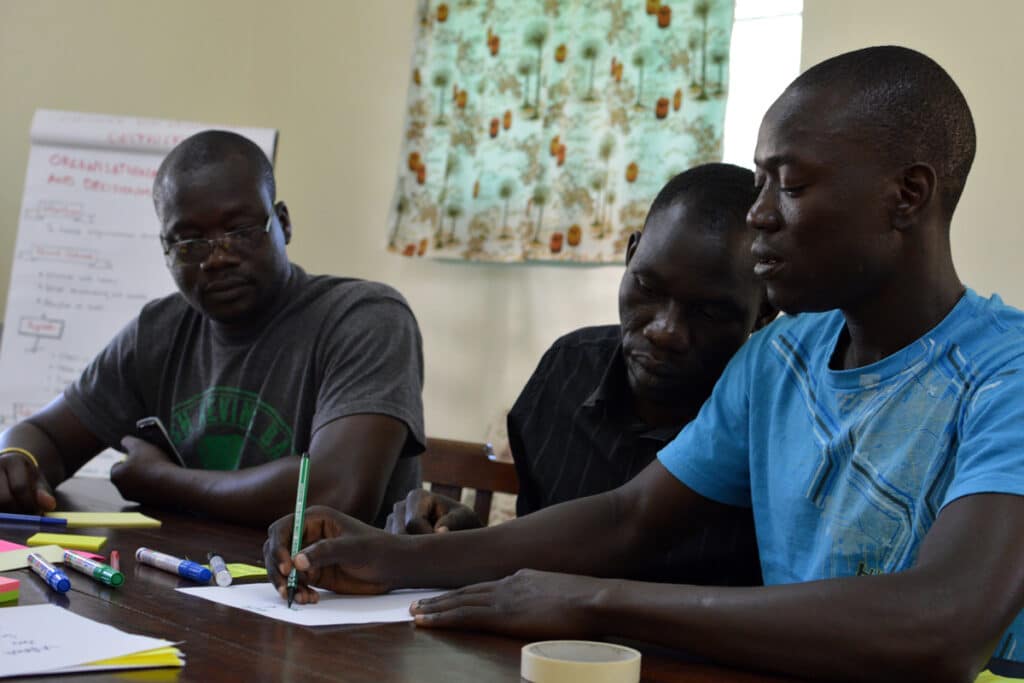
For nearly three decades starting in the late 1980’s, over 60,000 girls and boys in Northern Uganda were forcibly conscripted into fighting a guerilla war against their government, under the brutal domination of the Lord’s Resistance Army. In war that displaced 1.5 million people mainly of the Acholi ethnic group from communities such as Gulu and Kitgum, as well as the areas surrounding them, children bore an overwhelming weight not only as combatants, but also in carrying a stigma which has typically left them marginalized and overlooked as young adults today.
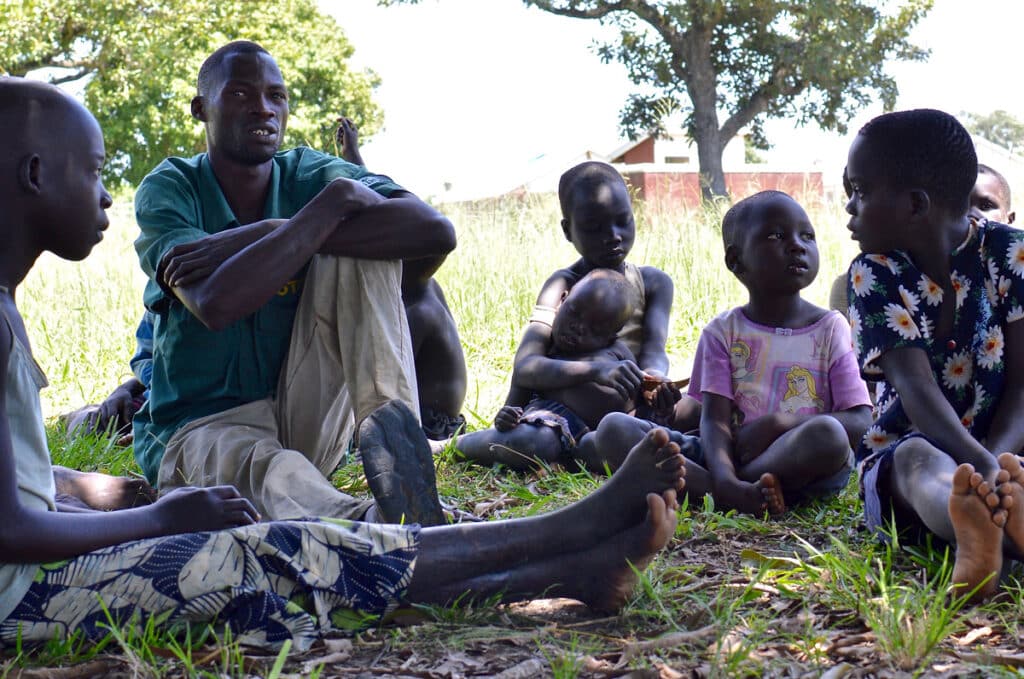
YOLRED, or the “Youth Leaders for Restoration and Development,” aims to address the challenges endured by former combatants with a key distinction which separates it from other well-meaning NGOs (non-governmental organizations) both local and international: YOLRED was founded by formerly abducted child soldiers to serve other young adults with the same shared experience. It is the only group of its kind to be designed, founded and led by members of the community which it serves.
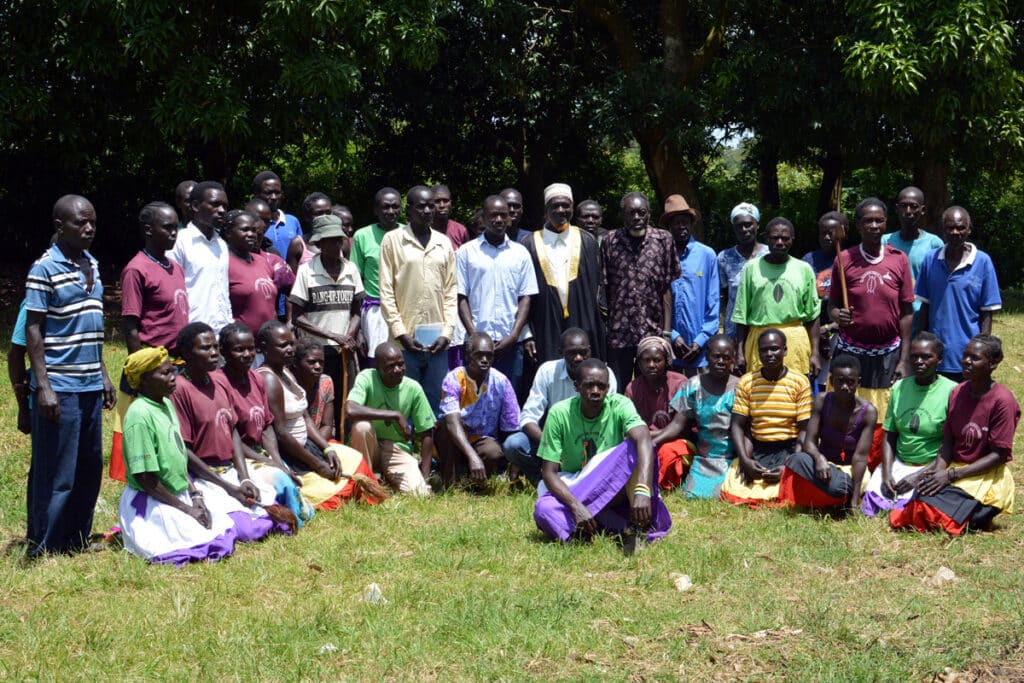
Its origins come out of mobilization of just under 200 former combatants from across Northern Uganda to capture and document oral testimony about their respective experiences in the civil war. Through a partnership with the Goldin Institute and local supporters, the core team of YOLRED led the effort to collect over 150 peer-to-peer interviews with former abductees about their experiences and insights.
Not unlike child soldiers in other countries who are undergoing the formal DDR (Disarmament, Demobilization and Reintegration) process without long-term support, many of those individuals who participated in the story collection project recounted being stigmatized, left homeless and struggling in poverty. The Goldin Institute in partnership with Arigatou International and Cartitas Counseling Training Institute worked with regional Ugandan leaders to support these child soldiers to assume agency and leadership over their own destinies.
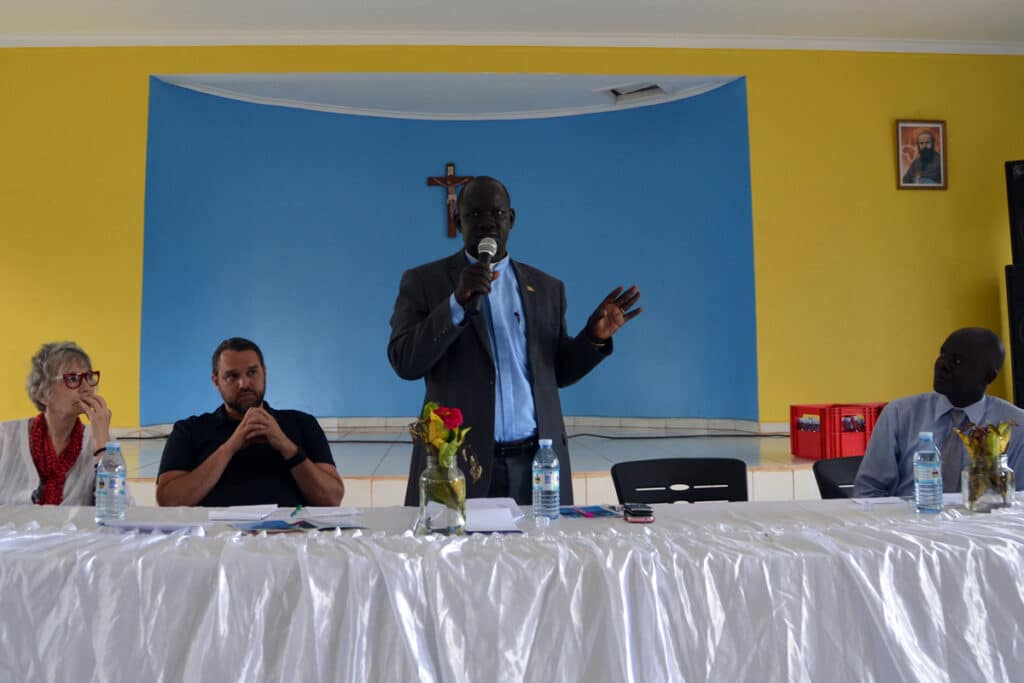
Equipped with this knowledge and the sense of solidarity developed through the research process, these community researchers produced the “Alone and Frightened” report to restore these voices to the conversation about reintegration and laid the foundation for an organization dedicated to achieving the aspirations of former combatants.
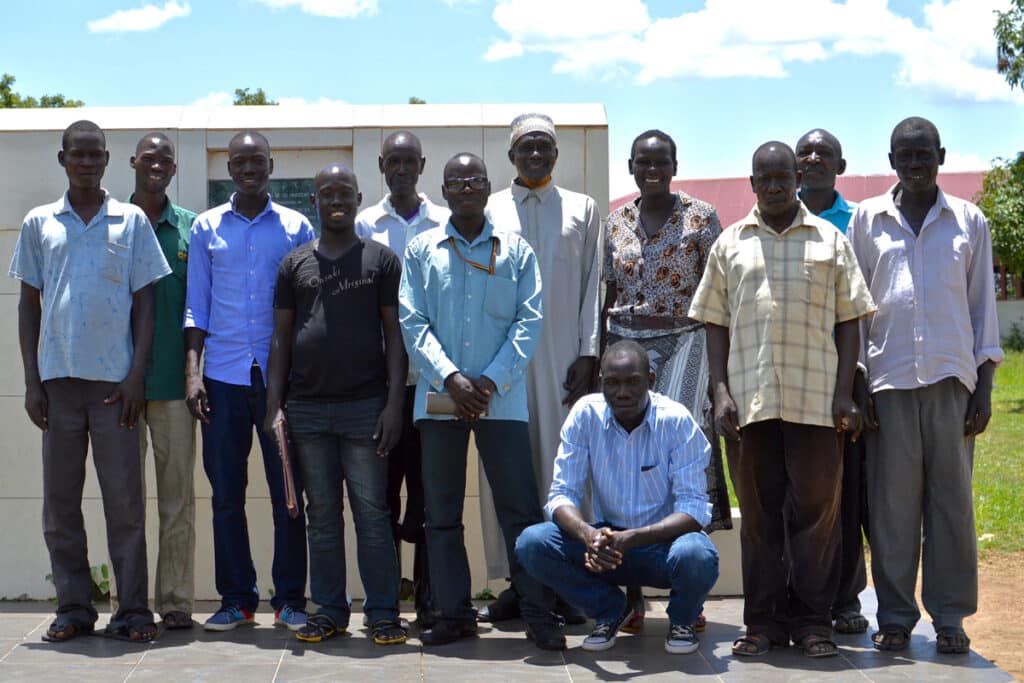
In a ceremony attended by partners from the Goldin Institute and a wide range of local partners, YOLRED was officially launched on August 27, 2016 in Gulu after years of careful planning, listening and outreach. YOLRED’s five co-founders – Geoffrey, Charles, Janet, David and Collins -- seek to support all young people who were impacted by the civil war, including ex-child soldiers, abductees, the displaced, the children of former abductees and child mothers throughout Northern Uganda. Indicators of well-being including health, education, employment and livelihood, as well as peace and security. The team is actively restoring the communities that were torn apart by the conflict and taking steps to prevent the abduction of children into conflict in the future.
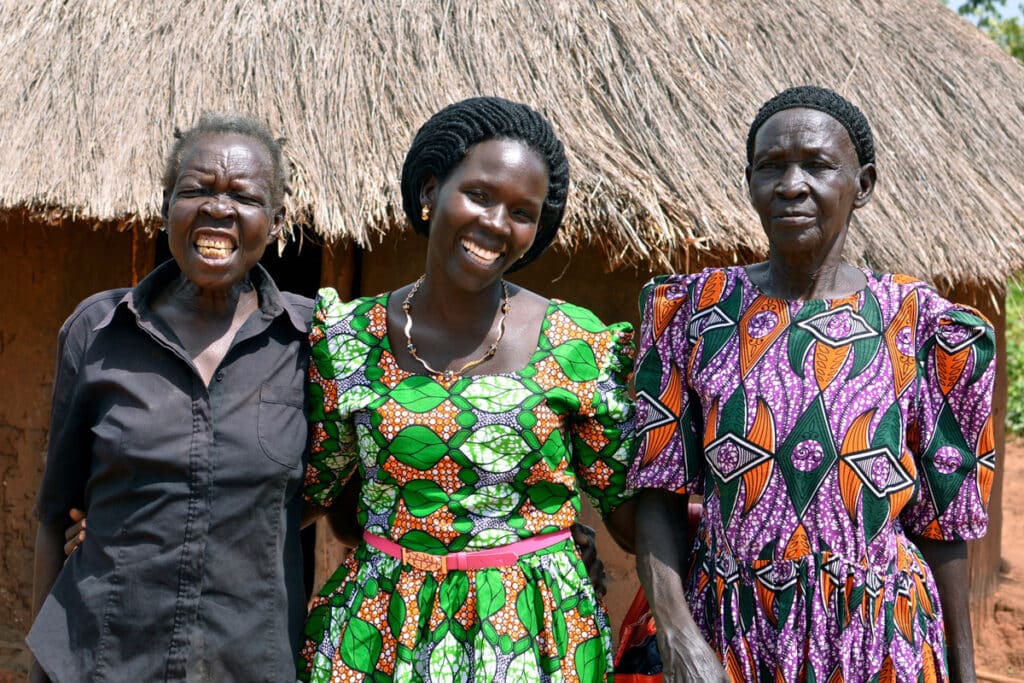
In preparing for the launch of YOLRED, the team partnered with the Goldin Institute, Arigatou International and Anorak who worked with YOLRED’s leadership to develop a five-year plan detailing its organizational structure and its primary initiatives including reconciliation, entrepreneurship and agriculture.
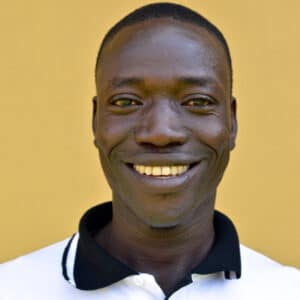
"I am happy for Youth Leaders for Restoration and Development, as a platform for former child soldiers. As a leader of the organization, I will [help] ensure that our problems and the solutions are implemented are locally. The output of this organization must be felt and seen in the communities." -- Geoffrey Omony, Co-Founder, YOLRED
Further, the credit union scheme is not only intended to provide low and no interest loans but also financial literacy for those without bank accounts nor a credit history. Grassoots entrepreneurs will be supported in their start-up efforts and encouraged to be peer mentors to others seeking to create businesses or authentic leadership in civil society and government. YOLRED will be critically evaluating all of its programming at key stages of its development.
Presently, the organization is applying for support from the IDEO Youth Empowerment Challenge, as well as Echoing Green for general operations as well as capacity building.
We invite you to learn more about YOLRED and how to get involved at www.yolred.org.
Follow Along as Former Child Soldiers Launch Reintegration Organization

August 27th Update:
I am pleased to announce that YOLRED, the first platform for Child soldier reintegration and rehabilitation in Africa that is owned and run by the former combatants themselves, is officially launched and up and running. Our work with the YOLRED team in Uganda ended with a public gathering to celebrate the official launch of the platform.
The team was able to share their vision with the public and was received with support from the community and different official stakeholders, NGO's and religious institutions. You can download the brochure that was distributed at the launch event here.
It has been an honour to see the fruit of over four years of hard work come to a big milestone, see the members of YOLRED rise and start to carry out a vision they have had on the inside for years. View our most up-to-date slideshow below:
[slide]
[img path="images/AnorakUganda010.jpg"]YOLRED Leaders Participate in Workshop on Strategic Planning[/img]
[img path="images/AnorakUganda011.jpg"]YOLRED Leaders Meet with Community Partners Throughout Gulu[/img]
[img path="images/AnorakUganda013.jpg"]YOLRED Leaders Participate in Workshop on Strategic Planning[/img]
[img path="images/AnorakUganda014.jpg"]YOLRED Leaders Participate in Workshop on Strategic Planning[/img]
[img path="images/AnorakUganda015.jpg"]YOLRED Leaders Meet with Community Partners Throughout Gulu[/img]
[img path="images/AnorakUganda016.jpg"]Anders from Team Anorak meets with Grassroots Community Leaders in Gulu[/img]
[img path="images/AnorakUganda017.jpg"]YOLRED Leaders Meet with Community Partners Throughout Gulu[/img]
[img path="images/Anorak_August2016/dianeG.jpg"]GI co-founder Diane Goldin meets with community leaders on the project[/img]
[img path="images/Anorak_August2016/w_danes.jpg"]YOLRED Leaders and ANORAK organizers, Morten and Anders enjoy casual moment for photo opportunity[/img]
[img path="images/Anorak_August2016/geoffery_work.jpg"]Team leader Geoffery meets with Grassroots Community Leaders in Gulu[/img]
[img path="images/Anorak_August2016/trav_trav.jpg"]GI Executive Director Travis Rejman with colleague Charles Okelo and family[/img]
[img path="images/Anorak_August2016/women_colors.jpg"]YOLRED participants display the local colors[/img]
[img path="images/Anorak_August2016/dianeG.jpg"]GI co-founder Diane Goldin meets with community leaders on the project[/img]
[img path="images/Anorak_August2016/w_danes.jpg"]YOLRED Leaders and ANORAK organizers, Morten and Anders enjoy casual moment for photo opportunity[/img]
[img path="images/Anorak_August2016/geoffery_work.jpg"]Team leader Geoffery meets with Grassroots Community Leaders in Gulu[/img]
[/slide]
Currently we are supporting the team in enacting their communications and outreach plan for both local and international supporters. In particular, we are providing some consultative support over the next two weeks to help them create their own website as an ongoing place of information and updates from YOLRED. Watch for an announcement in the next newsletter for the new website!
Now lies a lot of hard but exciting work for YOLRED, but with great support from the Goldin Institute, Arigatou International and wise partners on the ground, the team feels equipped and empowered, ready to reach out to their communities. We are very excited to follow the team’s progress in this coming period.
August 20th Update:
The Uganda team is working late hours these days with Team Anorak to be ready for the launch of YOLRED that will take place in only 6 days. The team is mobilising the community though many visits to local leaders and various sites in northern Uganda, they are also putting final touches on their leadership structure and preparing all the details for the launch next Saturday.
August 19th Update:
Along with my colleague Morten, I am pleased to share an update from our first week here in Gulu, Uganda with our partners from the emerging organization, Youth Leaders for Restoration and Development (YOLRED). We are inspired by the wisdom, creativity and passion that the former child soldiers of Uganda bring to the leadership of creating and managing their own organization. For the first time, former child soldiers themselves will determine their own strategies for reintegration and prevention.
To help finalize the organizational design, we have facilitated several workshops, helping the YOLRED team clarify and document the mission, vision and principles of this new organization.

We have also together made great progress in defining the organizational structure and plan to ensure that these young leaders will have the platform and support they need to acheive their ambitious mission.
These discussions with the YOLRED leaders have been informed by a wide range of key stakeholders including leading NGO’s, government offices, religious leaders and family members.

[block title="We can see the work over the past week has been crucial on two parallel levels" bg="#ce7019"]
First, through our conversations with community partners, we are raising awareness and enthusiasm among the stakeholders in the area. At the same time, this highly creative processes with the YOLRED team is designing solutuions to the missing pieces of their strategy and bringing a deep and inspiring cohesion and shared vision with the team.
[/block]
We look forward to keeping you updated as we move towards the public launch of YOLRED in the coming weeks.
If you have questions or suggestions, we're happy to hear for you.
Sincerely,
Anders and Morten, Team Anorak
A Call for Proper Justice

Our Executive Director, Travis Rejman recently wrote this editorial in the Huffington Post calling for the right justice to be considered in the case against Dominic Ongwen.
Ongwen has received international attention because of his role as a high-ranking soldier in Joseph Kony's Lords Resistance Army. To be sure, his crimes against humanity are not to be debated - as a leader within the LRA, Ongwen's actions were responsible for thousands of children and their families being killed, maimed and displaced. As Travis penned in his piece:
[quote]Major General Ongwen's roles in these atrocities is not in question. Demanding justice is not in question. The meaning of justice is."[/quote]
Because Travis co-authored the Huffington story with our longtime partner in Uganda, the retired Reverend Baker Ochola, the proper context was able to be provided on the nuanced meaning of what justice would be in this case, especially to those in the communities most impacted by Ongwen's actions. To many in these communities, Ongwen first and foremost was a victim himself in being abducted into the LRA as a child soldier.
The overwhelming call, especially by religious leaders in those communities, points to the desire for Dominic Ongwen to be returned to his homeland, where he can face justice at the hands of those most informed to determine what this will look like. To them, a faraway international court like the ICC is not the proper authority to prosecute and punish a former member of their own community. Read on for the full story at this link.
Update: Since the publication of the Rejman/Ochola piece in January, the International Criminal Court ruled that it would be holding over Dominic Ongwen for full trial at the Hague. We will continue to follow this story.
Alone and Frightened: A Summary of our Report
 In the discussions about disarmament, demobilization and reintegration of children used as soldiers in the conflict in Northern Uganda, the voices and perspectives of former child soldiers themselves have too often and too long been ignored.
In the discussions about disarmament, demobilization and reintegration of children used as soldiers in the conflict in Northern Uganda, the voices and perspectives of former child soldiers themselves have too often and too long been ignored.
To restore these voices to the discussion and to improve the services for former combatants, the Goldin Institute and local partners trained a group of former child soldiers in "Community Based Oral Testimony" as a tool for gathering these stories and perspectives. Through this project, former child soldiers themselves led the research collection through interviewing over 150 of their peers and together reflecting on common concerns and shared aspirations.
The results of this groundbreaking research are contained in the report, Alone and Frightened. Equipped with this knowledge and the sense of solidarity developed through the research process, the former child soldiers are now at the forefront of convening the National Platform for Child Soldier Reintegration in Uganda as a network for coordinating the work of NGOs, government agencies, religious communities and other partners who are working together to promote reconciliation and reintegration.
[quote]Child Soldier definition: A child soldier is one under the age of 18 and part of a regular or irregular armed force or armed group participation directly indirectly. Child soldiers perform a range of tasks including combat, laying mines, and explosives; scouting, spying, acting as decoys, couriers or guards; training, drill or other preparations; logistics and support functions, pottering, cooking and domestic labor; and sexual slavery or other recruitment for sexual purposes."[/quote]
- UNICEF 2003
 This study describes the state of children affected by the brutal war in Northern Uganda pitting the Lord's Resistance Army (LRA) against the Uganda People's Defense Forces (UPDF). These are stories of Former Child Soldiers (FCS), please use your discretion as these stories are both horrific and heart-rendering.
This study describes the state of children affected by the brutal war in Northern Uganda pitting the Lord's Resistance Army (LRA) against the Uganda People's Defense Forces (UPDF). These are stories of Former Child Soldiers (FCS), please use your discretion as these stories are both horrific and heart-rendering.
The study sought to achieve the following objectives:
- To facilitate a platform for FCS to share their experiences and challenges of abduction and escape from captivity.
- To establish the community and family perceptions and attitude towards FCS.
- To identify gaps in the implementation of the Cessation of Hostilities/Juba Peace Agreement (CHA) (2006), agenda item V on DDR, the institutional mechanisms and the current state of FCS with regard to DDR.
- To establish and highlight the locally-generated and FCS-based frameworks for reintegration.
- The content scope of this research was to document and analyze the experiences and challenges of FCS with regard to their reintegration into families and communities within the CHA broader agenda item V.
Design:
A total of 180 primary informants were purposely selected out of 264 interviewed using the principles of participatory feedback and primary respondent-centered ownership of the research. Of respondents, 52% were male, and 48% were female.
Key Findings:
Females seemed more unwilling to respond to the the participation due to fear of being identified, fear of community reprisal or, a manifestation of inadequate or lack of psycho-social support.
- The majority of children abducted (58.9%) were 15 years of age and below, a clear indication of loss of childhood including schooling for many, in addition to horrifying traumatic experiences.
- Major health issues were identified among FCS including bullet wounds and fragments in the body, septic wounds, fistula, HIV/AIDS and cardiac problems.The physical scars or bullets lodged in their bodies has rendered some of them unable to find spouses or fend for themselves.
- Of the 87 females interviewed, 39 returned as child mothers.
- While 60% of the abducted children found themselves in the hands of Uganda People's Defense Forces (UPDF) and later reception centers, many (40%) did not receive initial counseling and support. Many experienced constant death threats, spiritual initiation rituals ranging from sitting on dead bodies to having sex with an older person, lasting 1-6 years in captivity. Thus, one can understand the extreme levels of trauma and lack of livelihoods among FCS currently.
- Large portions of FCS expressed concerns of psychological suffering and/or trauma as a result of their experiences in captivity, including but not limited to, nightmares, anxiety and fits of anger, as well as alienation, appropriation, dispossession, guilt, loneliness, and poor relation with others (aggression, shouting, commanding, etc.).
- Over half found either one or both parents dead. This means a sizable number returned as orphans, with a greater number losing their fathers.
To learn more about the next steps and the multi-sector network promoting reintegration and reconciliation, click here to read about the work of the National Platform for Child Soldier Reintegration and Prevention in Uganda.
The following slideshow includes recent ESPERE workshops featuring our colleagues in Uganda and Kenya. Many of the participants represent the aspirations detailed in the Alone and Frightened Report.
[slide] [img path="images/slideshow/full/uganda2014_1.jpg"]Co-founder's Diane Goldin and Travis Rejman meet with Everest Okwonga, the Principal at St. Janani Luwum Vocational Training Centre[/img] [img path="images/slideshow/full/uganda2014_2.jpg"]Co-founder's Diane Goldin and Travis Rejman meet with students at a trade school for former child combatants in Gulu[/img] [img path="images/slideshow/full/uganda2014_3.jpg"]Co-founder Diane Goldin meets with students in a Gulu classroom during the Institute's June2014 trip to the region to take part on child soldier reintegration efforts[/img][img path="images/slideshow/full/uganda2014_4.jpg"]Participants of a workshop conducted by Global Associate Lissette Mateus Roa take part in one of the exercises teaching 'forgiveness'[/img][img path="images/slideshow/full/uganda2014_5.jpg"] Global Associate Lissette Mateus Roa (bottom left) and her group of ESPERE students. Also included is friend and colleague and Associate emeritus Dr. Dorcas Kiplagat (standing 5th from right)[/img] [img path="images/slideshow/full/uganda2014_6.jpg"]Participants of the ESPERE workshop during a training session[/img][img path="images/slideshow/full/uganda2014_7.jpg"]Global Associate Lissette Mateus Roa (standing) leads a training session in Gulu[/img][img path="images/slideshow/full/uganda2014_9.jpg"]Global Associate Lissette Mateus conducts an exercise with participants of the ESPERE workshop in June 2014[/img][img path="images/slideshow/full/uganda2014_15.jpg"]Global Associate Lissette Mateus (sitting foreground) leads her ESPERE training group[/img][img path="images/slideshow/full/uganda2014_28.jpg"]Co-founder Diane Goldin meets with students at the St Janani Vocational School. The School is made up of mostly former child soldiers learning new skills (like carpentry in this classroom) to rejoin civilian life.[/img] [img path="images/slideshow/full/uganda2014_27.jpg"]The workshop attended by former child combatants[/img][img path="images/slideshow/full/uganda2014_34.jpg"]Institute co-founder Diane Goldin meets with Ajok Dorah - a psychologist specializing in giving counsel to former child combatants returning to their communities.[/img][/slide]
East Africa Update
Our Leadership Team Makes New Alliances and Reaffirms Existing Ones in our Work to End the Use of Child Soldiers in East Africa
This Fall provided ideal timing for our co-founders to shore-up important project work in Kenya, Rwanda and Uganda.
In late September, Travis and Diane journeyed to East Africa for several important regional events – allowing for follow-up to our ongoing child soldier reintegration efforts, while making inroads to support new initiatives.
Along the way, Travis and Diane were able to meet-up with some old friends of the Institute, re-establishing ties with some of the folks who took part in our earliest 'grassroots partnerships.'
What Took our Leadership Team to Kenya and Rwanda
Beginning with our work in Colombia in 2007, the Goldin Institute has spent several years working on the issue of Child Soldier Reintegration. What started as a National Partnership in that same year to engage Colombia's social, private and public sector agencies to prevent the victimization of vulnerable young people in armed conflict, has expanded in most recent years to include the ESPERE project throughout Latin America and the successful sharing of the methodology with our newest partners in Eastern Africa.
An Opportunity to Stop the Recruitment and Abduction of Child Combatants
As our work in Kenya, Rwanda and Uganda has been focused on helping young people avoid recruitment into violent extremist groups, particularly Al-Shabab, Diane and Travis traveled to Africa for an important opportunity to stop the recruitment (and in some cases abduction) from happening in the first place. This new project has two primary elements – a youth leadership development component named the Youth Peace Ambassadors and the public solidarity element named CRAVE: Community Resistance to Violent Extremism. The Goldin Institute is partnering with an established organization already on the ground, known as Peaceful Innovation. Through this partnership we are focusing on the areas from which local extremist group Al-Shabab has done heavy recruiting – the Mombasa Coast, "slum" areas in Kenya and the refugee and IDP camps in Rwanda. Peaceful Innovation offers the youth who are being targeted by Al-Shabab an effective mixture of counseling, peer groups, and job training with the end goal of reducing the number of viable recruits for Al-Shabab, thus, reducing their size and acts of extreme violence.
The Official Launch of Alone and Frightened - Former Child Soldiers Get to Tell Their Own Story
Over the years, the Goldin Institute has worked with Arigatou International and the Global Network of Religions for Children to research, document, and analyze the experiences and challenges of former child soldiers to develop appropriate programs for their reintegration. The culmination of the research was released in the report Alone and Frightened: Experiential Stories of Former Child Soldiers on Improving Reintegration. While the report was published in 2014, the official launch occurred while Travis and Diane were in Kenya. Our colleague and former Global Associate Dr. Dorcas Kiplagat, was instrumental in both the research done in bringing together the child soldiers to tell their stories in Alone and Frightened and in bringing it to print, so it was fitting that Dr. Kiplagat was so involved in the official launch ceremony. To that end, Dorcas has shared this full report of September's Events.
We remain encouraged to see that with the expansion of our child soldier work into new regions and with new partners, we get closer to participating in an effort that ends the recruitment of child soldiers. To learn more and become more involved, please follow this link.
